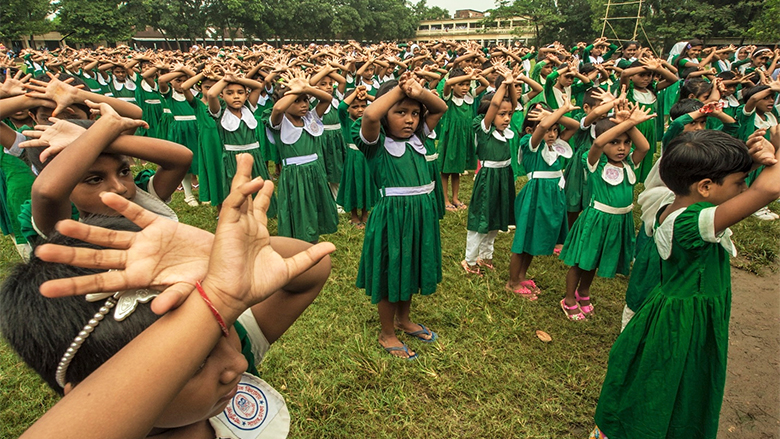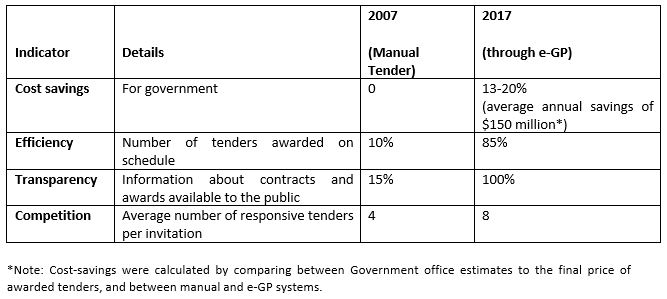Feature Stories
- How Bangladesh bridged the gap between amateur and professional in government procurement
- Rated Criteria: Promoting Value in World Bank Procurement
- Public Procurement Transformation in Bangladesh
- Achievement of Value for Money and Enhancement of Efficiency, Economy and Transparency in Procurement - Document Archive System
Archives
- End-to-End Procurement Planning and Maintenance System Integrated with Project MIS
- Application of Construction Milestones in Rural Road Contracts of Nepal
- Gross National Happiness Model for Pursuing Sustainable Public Procurement
- Government procurement is the basis of wide opportunities for enterprise development
- The Challenges of Procurement Training in a Fragile Country: the Afghanistan Experience
- When and How to Open Contracts: Transparency and Engagement through World Bank Projects
- Innovations and Best Practices in Procurement Processes of Disaster Recovery Projects
- World Bank Experts Discuss Global Procurement Trends and Armenia's e-GP system with the National Assembly
- Technology driving transparent and accountable public procurement reform in Bangladesh
- Prototype for Implementation of Framework Agreement via Blockchain
- Construction Project Planning and Management Capacity Building in India: A Wholistic Approach to Boost Infrastructure Development
- Zimbabwe: Public Procurement reform to catalyze greater transparency and development
- 15th Procurement, Integrity, Management and Openness (PRIMO) Forum
- e-Procurement World Map
- Preventing and controlling corruption: A modern approach to Procurement
- 6th South Asia Public Procurement Conference held in Thimphu, Bhutan
- South Asia Procurement Innovation Awards 2018 Announced
- Procurement iNET completes 5 years and new CPPP Fastest 100% Challenge Launched
- Risky Business: Does Debarring Poor Performers Mitigate Future Performance Risk?
- Global Procurement Summit 2019, New Delhi, India
- World Bank India launches Survey for International Civil Works Contractors
- World Bank launches new Complaints Module in Systematic Tracking of Exchanges in Procurement (STEP) System
- New Open Contracting Data Standard for e-Procurement Systems Launched
- Bangladesh's success in public procurement: Sustained reform really pays off
- The five drivers for improving public sector performance: Lessons from the new World Bank Global Report
- South Asia Public Procurement Innovation Awards 2018
- Conversation with Khaled Elarbi, President, High Authority for Public Procurement (HAICOP), Tunisia on the Digitalization of Public Procurement
- Breaking the glass ceiling in Africa: Rwanda E-Government Procurement System
- How government e-marketplace is revolutionizing procurement in India
- Ensuring Value for Money in Infrastructure Projects - The Botswana way
- Blockchain Lessons for Procurement
- Botswana’s Benevolent Move to Enhance its Procurement Profession
- Achieving Better Value for Money Using e-Auction for Procurement of Goods by Public Sector - A Success Case from DPDC
- Guide to Project Management and Contract Management (GPMCM) – New Approach to Improve Efficiency and Effectiveness of Procurement Outcomes
- Regional Winners of SAPIA 2017 participate in 8th International Public Procurement Conference (IPPC 8) Arusha, Tanzania
- The Future of Public Procurement in the Era of Digitalization
- World Bank Operations Procurement Helping Turkey to Procure a US$2 Billion Gas Storage Facility
- Unlocking Energy Efficiency Market in India - Through Innovative Procurement Business Model
- Getting value for money: Creating an automated market place for farmers in Pakistan
- Towards a Single Market for Public Procurement in Caribbean Small States
- Web-Based Online Evaluation Tool (e-Tool) for Procurement of Works by Royal Government of Bhutan
- Strengthening Health Sector Procurement System Offer Hopes for Universal Health Coverage in Nepal
- Morocco makes Strides in Modernizing its Public Procurement System— Operationalization of the Procurement Regulatory Body
- Innovations in Procurement Process and Selection that Lead to Improved Outcomes – Tenderers’ Database Management System
- Looking Back and Forward: The World Bank’s Procurement Framework
- Independent Monitoring and Evaluation of Contracted Health Services Leads to Improved Outcomes in Rural Areas of Afghanistan
- Fifth South Asia Region Public Procurement Conference brings focus on Procurement in Public Service Delivery
- 12 Procurement Innovations from South Asian Countries Celebrated
- Social Media is Improving Procurement in Lao PDR
- ASEAN meeting explores ways of professionalizing public procurement to meet development challenges
- Second International Training Program on the World Bank’s New Procurement Framework
- South Asia Procurement Innovations Award 2017 launched with Bigger and Better Prizes
- How to bid, finding opportunities, what makes a successful bid
- Pushing boundaries in procurement framework implementation
- Experience of Developing PPSD for the Assam Agribusiness and Rural Transformation Project (APART), India
- An Electronic Approach: Streamlining Georgia's Procurement
- South Asia Heads of Procurement Knowledge Exchange Program to U.S. Government Procurement Systems started
- 13th Procurement, Integrity, Management and Openness (PRIMO) Forum - a Documentary
- Bangladesh to strengthen public procurement with World Bank supported Project
- Establishment of Technology-Based Health Procurement and Supply Chain Management System, and Capacity Development in Tamil Nadu Medical Services Corporation
- Towards a Single Market for Public Procurement in Caribbean Small States
- Redefining Procurement as an Innovative and Collaborative Centre of Excellence for Best-in-Class Sourcing Solution
- India’s PowerGrid Endorsed for Alternative Procurement Arrangements by the World Bank
- Achieving Value for Money in Indonesia’s Geothermal Project
- Citizen Monitoring of Rural Roads Under Pradhan Mantri Gram Sadak Yojana (PMGSY), India
- Establishment of Grant and Service Contract Management Unit (GCMU) to Manage Contracting Out of Health Services in Afghanistan
- Procurement for Regional Development–Public Policy Initiative in Sri Lanka
- PPAF Community-Driven Development (CDD) Procurement Model, Pakistan
- Making Successful Procurement of IT Systems - An Experience from Vietnam
- Procurement Observatories continue to deliver in India
- Implementation of National e-GP System in Nepal
- Government e-Marketplace (GeM), India
- Africa High Level Public Procurement and Electronic Government Procurement Forums
- Development of Procurement Cadre as Part of Holistic Procurement Reforms in Bhutan
- Modernizing Public Procurement in Zimbabwe, one Step at a Time
- Citizen Engagement During Public Procurement Implementation in Bangladesh
- Winter 2017 Virtual Procurement, Integrity, Management, and Openness (PRIMO) Forum on Sanctions and Debarment Systems
- Close and Personalized Procurement Monitoring, Leading to Procurement Efficiency in Irrigation Sector in Fragile and Challenging Environments of Afghanistan
- Procurement Framework 2016 offers wider choices to ‘Go to Market’ based on PPSD
- Procurement Framework 2016 - Benefits, Status of Roll-out and M&E Arrangements
- PPSD offers Fit for Purpose Procurement Solutions
- Global Procurement Summit
- Fourth South Asia Region Public Procurement Conference
- The World Bank e-Procurement Tools
- South Asia Procurement Innovations Awards, 2016
- Learning Videos launched on STEP, online tracking tool on procurement for World Bank Projects
- Open e-Learning is Building a Cadre of Procurement Experts
- South Asia Region Public Procurement Conference, 2017
- Online Certificate Program in Public Procurement in Arabic Launched in Egypt
- First Procurement Knowledge Exchange Forum among ASEAN Countries
- Nobel Prize in Economics for contribution to Theory of Contract
- The Africa Region Harnesses Integrated e-Government Procurement (e-GP) Systems in Pursuit of Transparency and Integrity
- Procurement Reform for Humanitarian and Development Challenges in Kurdistan Region of Iraq (KRI)
- Successful Procurement is not just a set of Activities, it is a Strategy
- Afghanistan - Trends and Recent Developments in Governance
- PPSD is an Opportunity for clients and staff for Improved Procurement Management
- Procurement Reform Advances in the MENA Region
- Data Analysis and Collaborative Work in Action for Expedited Disbursements in Africa
- Ensuring Good Governance in Procurement in Sri Lanka
- New Procurement System to Improve Development Impact and Transparency in South Asia
- World Bank, USTDA Formalize Procurement Partnership
- How the New Procurement Framework Will Benefit 45.6 Million People in India
- Procuring the Future
- Reasons to Bid, Finding Business Opportunities
- New World Bank Procurement Framework Promotes Strengthened National Procurement Systems
- The readiness for Procurement Framework 2016
- 6 Things to know about New Procurement Framework
Bangladesh's success in public procurement: Sustained reform really pays off
Zafrul Islam, Lead procurement specialist, The World Bank
A healthy mix of innovation, continuous engagement, and effective implementation can bring about sustained transformation in public procurement. A more effective and transparent procurement system frees up public money for achieving more and better development outcomes and improving the delivery of public services.
Procurement makes up a substantial portion of government spending with significant impact on the delivery of public services such as water, health, education, and other infrastructure. Bangladesh spends about $16 billion or about one third of its annual budget on public procurement. Of this, $13 billion is spent on the public procurement of goods, works, and services for the implementation of development programs, constituting approximately 70% of the country's development budget.
Given the importance of procurement in achieving national development goals, the Bangladesh government made a strong commitment to reforming the public procurement system consistent with global standards, and in partnership with the World Bank. This strategic engagement spanned over 15 years through three successive projects as opposed to an ad-hoc, one-off intervention.
These sustained efforts provided with the opportunities for deeper and longer engagement with relevant stakeholders while allowing for thoughtful design and careful sequencing of reform phases. More importantly, these efforts have helped ensure political buy-in leading to a comprehensive and sustainable transformation in the system. The remarkable results are now visible, far-exceeding everyone's expectations.
Results of reform
The interventions, for example, resulted in significant cost savings for both the procuring agencies and the tenderers. On average, the reform resulted in an annual savings of $150 million - with that amount the country can build over 1,500 km of rural roads or 3,000 primary schools.
Further results included enhanced efficiency, transparency, increased competition and overall, better delivery of public services. (See table below for more details)

In 2017, Nielsen Company (Bangladesh), a market research firm, conducted an opinion survey on procurement reforms covering a target group of tenderers, procuring entities, civil society members, media, and financial institutions. Overall, 79.3 % of respondents were positive about improved transparency in public procurement; 76.6 % expressed procurement reforms as effective; 72.3 % recognized the system as efficient; and 81.9 % mentioned improved accountability.
How did it happen?
The reform process in Bangladesh began in 2002 with the World Bank Country Procurement Assessment Report which identified several areas of improvement in the country's public procurement practice, including: absence of legislations, bureaucratic processes, manual procedures, capacity constraints, and inordinate delays. To address them all, first the technical aspects of reform were set in place: an institutional and legal framework was developed. Further, a central regulatory agency, a Central Procurement Technical Unit, within the Implementation Monitoring and Evaluation Division (IMED) of the Planning Ministry, was also established in 2002, followed by a Public Procurement Act (2006) and Public Procurement Rules (2008). With this foundation, the reform was rolled out.
The reform process required not only technical but also substantial political and behavioral interventions. A few integrated elements, for example, were critical for success. These elements included: managing the political economy, developing innovative technology, such an electronic government procurement system, e-GP, building capacity of public officials and tendering community, involving citizens in the monitoring of public procurement contracts, and measuring procurement performance through data analytics across dozens of indicators.
More importantly, these efforts have been supported by a nation-wide stakeholders' engagement and communication program to sensitize and promote knowledge, awareness, and participation of key stakeholders, including government officials at different tiers, tendering communities, civil society, journalists, legal professionals, private sector, financial institutions, and, of course, citizens at large.
All these efforts show that reforming public procurement systems requires a sustained and long-term effort, through which every relevant stakeholder needs to do their part and has a lot to contribute. At times, this may not be easy to implement, but the results on the ground and the savings achieved show that these efforts are worth making.
